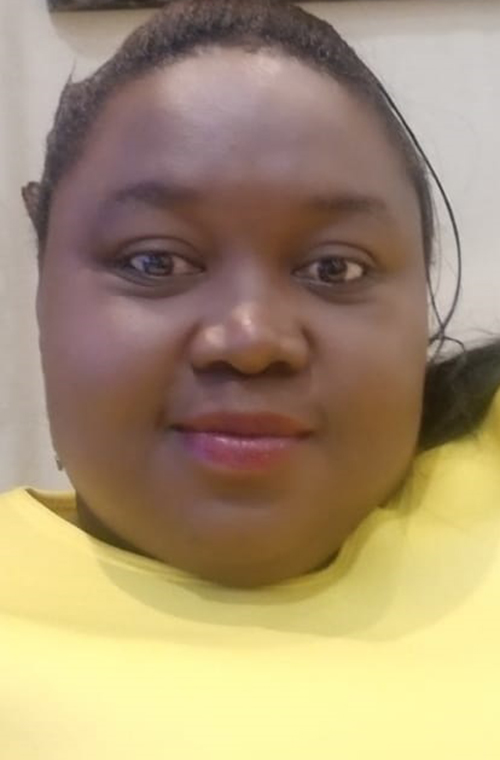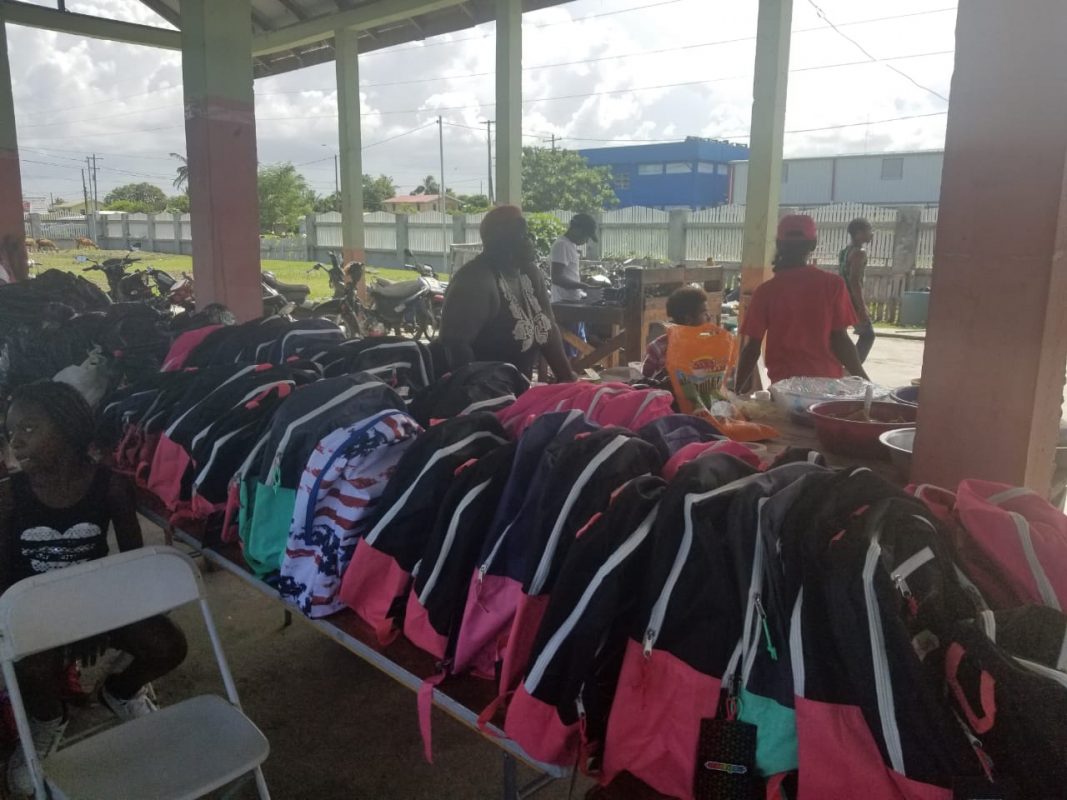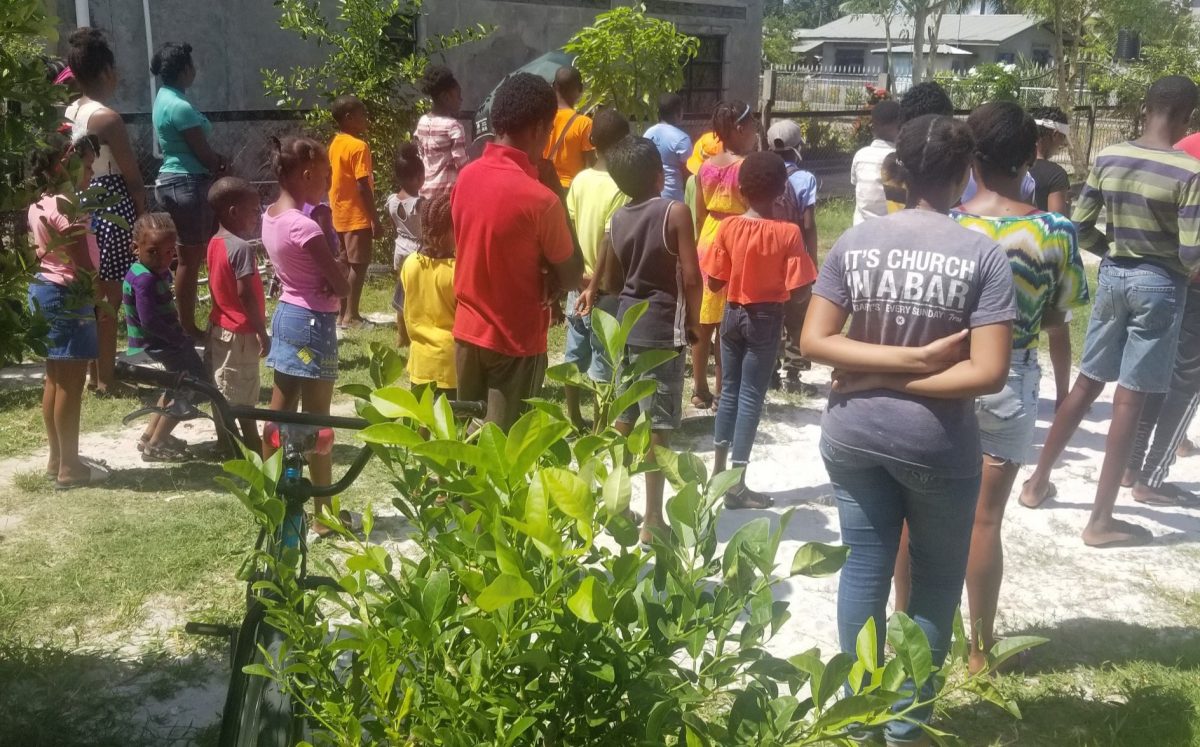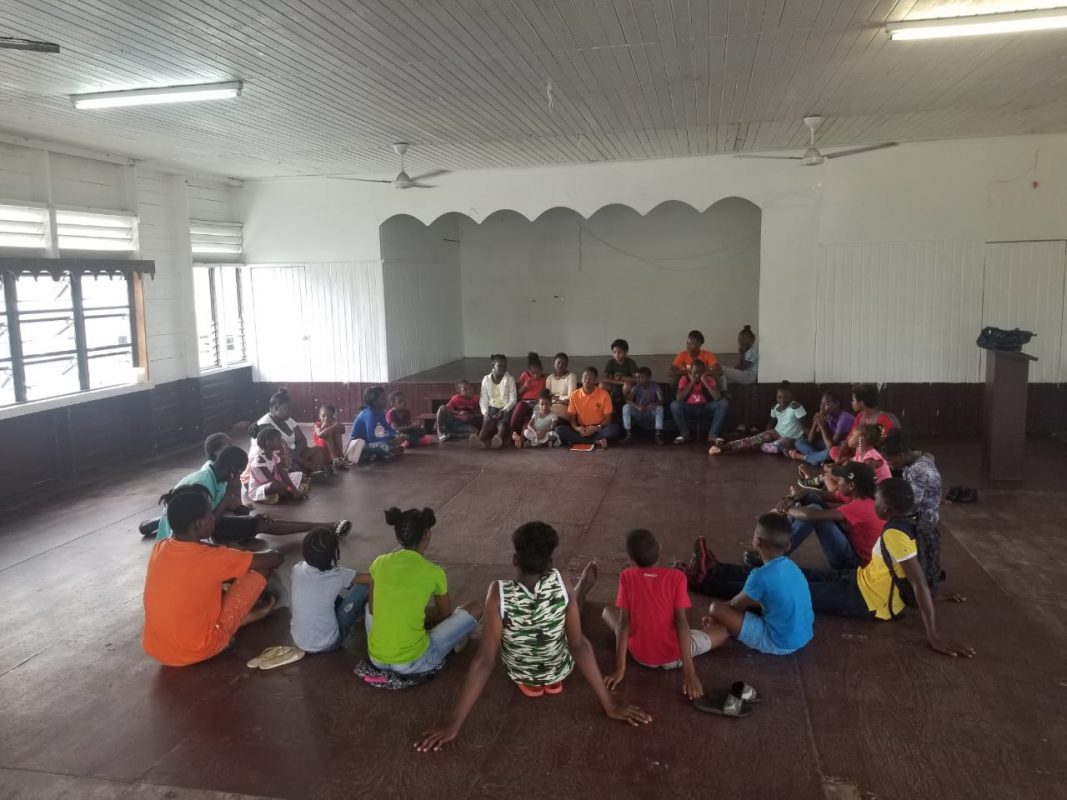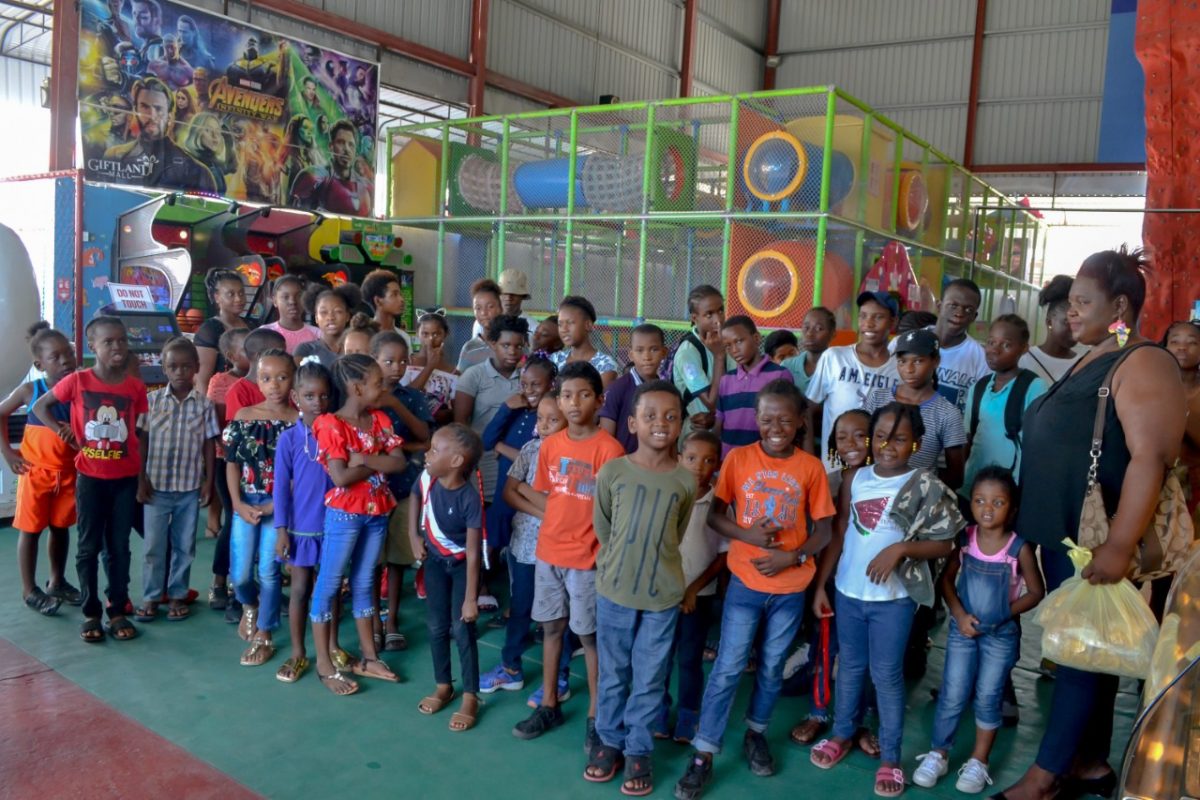Living in a depressed community for the last eight years, Odessa Primus has seen poverty in all forms and witnessed its negative impacts. Not one to sit and wring her hands, she has been assisting the most vulnerable: children and seniors. Recently, with some benevolent assistance, she has been providing 100 children with one meal three days a week.
Primus accepts that this might seem like the idiomatic “drop in the ocean,” but for the many children of Sophia who go to her home three times a week, rain or shine, that hot meal is a boon. Primus hopes to add two additional days and at least provide one meal a day, five days a week. She pointed out that there are 20 children who live in one yard.
Primus wants to see more persons assisting in their communities in whatever way they can.
“I feel that people should do as much as they can to help. That is extremely important. You don’t have to do big things, if you can help five children, ten children however many you can,” she encouraged, while adding that as a society we cannot just depend on the government.
She also pointed out that for every child who is failed in a community, it is a step back for that community.
It was with that philosophy in mind that the well-known artiste and community facilitator registered a foundation under the name Sophia U Empowerment Network, of which she is President. At that time she was concerned about the children and the number of teenage pregnancies in the community. She shared that there were five teenagers in her street alone at that time who had children; one of them now has three children. At one time, Primus was on a United Nations project that focused on the development of communities and she has worked with a number of other communities to assist youth.
She believes that there are enough resources and funding to assist the vulnerable, but what the country does not have are “people who care enough to do what has to be done, because everybody feel if they don’t get pay, it don’t mek sense”. She advises that people should do what they can. She noted that providing the meals is a major sacrifice on her part, but she is comforted in the fact that the children are being helped.
‘Essential’
Primus says the meals being provided are essential and referenced the fact that some children go for their food even if it rains heavily. That is one of the reasons she also ensures that she is involved in the distribution of the meals as she knows the children and she wants to ensure they receive the food.
She would be happy to see other groups springing up in more communities, even as she was quick to caution that it does cost a lot of money and sometimes the promises of donations do not materialize. However, Primus does have a good relationship with some members of the business community who have been supporting the venture along with private individuals. One young lady has committed to donating $20,000 a month.
While there have been difficult days, Primus said she has lived long enough in Sophia to make something happen and she has never been out of meat since the programme started, so there is always something to cook.
Over the years, she has held football tournaments and drama classes for children among other initiatives in an effort to have them meaningfully occupied.
And apart from providing meals for the children, Primus has hired two single-parent mothers to prepare the meals. She disclosed that one of them has 13 children and she thought it would be a good way of providing her with some needed income.
Primus explained that the Sophia Primary School provides lunch for its pupils, but since school closed in March due to COVID-19, it was discontinued. She said a number of factors have resulted in many children not having enough to eat and they cannot be expected to learn virtually from home on empty stomachs.
“So I just decided that until the government decides to find or put systems in place that will see children at least being able to get one solid meal a day, that I could do something. Because I ain’t able complain about nothing that nobody ain’t going to listen or do something about. I just feel if you could do something, do what you could do to fix it and don’t fight up with a lot of rowing…” the plain-spoken Primus said.
She admitted that prior to two months ago, when she actually started doing something, she was too “wrapped up” with what was happening with elections and not paying attention to what was occurring outside of the five months elections furore.
When it was over, and the COVID-19 numbers continued to climb, she realised that the school feeding programme would not be restarted soon and decided that she had to do something and not look to see who was responsible. As a public personality with a social media following, she put her “everybody could do something” maxim into action.
She had been sharing whatever she had with people who visited her home, and this prompted her to start the feeding on a larger scale.
Primus is well aware of the struggles of those around her, hence her decision to share out hampers in the past. She added that many people are not conscious of the hugeness of Sophia and donations do not actually cater for all of the needs of those who live in the community. She has also assisted children with school supplies, hosted Christmas parties, and held shows for children free or at a reduced cost. This year, she will host a Christmas party for children, but Santa Claus will be on the road and the children will just walk in and uplift their bags and gifts; there will be no fraternizing.
She knows that many senior citizens live on their own and are in dire need of assistance and that is a “disaster in itself. Everything I do here, I always try to focus on the people who need it most because I am here long enough to know who needs it most…,” she said.
Do better
Her children are least affected as they both attend private schools and are accessing online learning, but Primus said when she looks around the community she is in anguish because so many are not doing any consistent form of schooling. She said people would sometimes ask why she is bothered, as her children are being schooled, but she noted that whatever happens to the children in her community will affect her life eventually, directly or indirectly.
“You cannot be in a place and be totally unbothered about what is going on. … if people can’t find food how the hell they paying for internet? Internet is not a necessity, food is. And if you don’t have the necessity then how could you have something that as far as you are concerned is a luxury?” she questioned.
She said there are a series of challenges and she believes as community they should have been able to do better. Pointing out that most areas have community centres, Primus questioned why hot spots have not been set up at these centres and devices provided for children to access their work under supervision, with COVID-19 protocols being observed.
Touching on the printed material being distributed to children now at home, she noted that many parents cannot read or write and questioned who is explaining the work to them. Primus pointed out there are parents who expect their children to understand the work immediately after it is read to them and then there are those who have to work and do not have the time to assist their children.
“There is disaster all around. Coupled with the fact that a parent may be able to help you and be nice, they are stressed out because they cannot pay their bills and the slightest thing you say is for them to want commit a murder,” she noted.
For her, the reopening of the schools for the older children is necessary and while she is not for the younger children returning to school, she is concerned about those in grades 5 and 6 not being in a classroom because eventually they will have to be assessed and she believes it will be unfair to those who have had no consistent schooling.
She also pointed out that in many communities children are on the streets more than they are in their homes and she is aware of the fact that at times being outside is safer, while some are also earning to assist their families.
Take for granted
Primus feels that many people, when assisting communities like Sophia, take things for granted and tend to ask presumptuous questions like why a woman has so many children.
“First of all, we’re past that juncture, the children exist, and it is now how we could help these children. Second of all, we assume that these people have basic common sense, and they should know and should understand; that is not true. If you sit and talk with people you would realize that their reasoning and understanding of things that are very basic in life are significantly different from the way you and I would see [those things],” she said.
The help needed is much bigger than children receiving a meal or a hamper. And while she was quick to add that the example above is not representative of the entire community, she noted that the number of people who are in such situations outweigh those who have surmounted the same challenges.
She also objects to persons wanting to find out someone’s life story before giving them assistance; she pointed out that people are quick to judge others based on their standards.
“I think therein lies the biggest problem, because unless you are standing in my shoes, in my position with my foot size you would never understand how I feel… Unless you take every single factor that will put you in the same position as me, then you will never be able to understand and I think that sometimes we have to not only put ourselves in people’s position but look at a situation holistically,” she advised.
She pointed out that people’s life experiences start when they are children and when these are horrific they can often determine the lives those who suffer lead as adults. These are factors that people do not take into consideration. There are times when a breadwinner is killed and it makes the news, she said, but no further support is given to the grief-stricken woman and her children. The children may then be forced to fend for themselves and for some a life of crime may begin.
As a result, she argues that assistance cannot just be a one off-act, like giving a hamper; it has to be more consistent to really assist the family in need.
She believes there should be more stories or public service announcements that would help to effect a change in the way Guyanese think about the most vulnerable in our society. If those who are presumably educated are unable to understand another person’s situation, she questioned, then where does that leave society?
Primus is not for the taking of photographs of those who are being assisted. If a donor demands evidence that the assistance is given, then they are free to accompany her when making the donation. “Even if I am not posting a picture on social media, I don’t like the humiliation of having somebody pose up with a hamper to take out a picture. It does hurt me and in my head I feel it is too much… not because you giving somebody something you have them pose up and hold a bag… Look, listen, don’t do it,” the social activist warned.
She said while she is conscious that people who see such photographs might feel inclined to support other ventures, she still feels it is unfair to those who are receiving the assistance
“Everybody can help in some way and everybody has different influences, and they can help out in their community. It does not have to be something on a large scale; we all see things and we can do something about it. We just complain about things… unless you are prepared to do something then don’t complain,” she encouraged.
